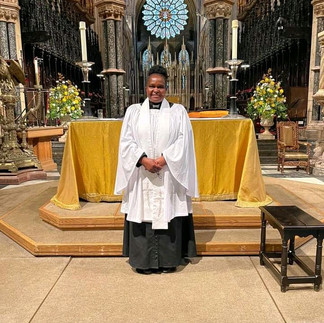A Diaspora Story:Becoming a Female Priest
- Setrida Chikwense

- Jul 7, 2021
- 3 min read
Women all over the world are achieving great things in different fields of agriculture, technology, medicine, and more. Malawi has been catching up with the rest of the world. Today, Malawian women and girls are becoming what society said they could never be, from heading top government positions to thriving and dominating male-dominated industries. Some prominent institutions however are still reluctant in accepting women as leaders. Most Churches, for example, backed up by religious doctrines and cultural beliefs are still rigid when it comes to embracing women in the ministry. Luckily, there have been a few churches that have taken bold steps to challenge such practices. For instance, in 2000, the Presbyterian Church, one of the well-grounded churches in the country, publicly made its stand clear by ordaining the first female church minister. Following in these footsteps, we have Malhaha Botomani Wachepa who has become the first Malawian woman priest in the United Kingdom (UK).
Wachepa’s journey into priesthood started in 2002 when she moved to the UK with her family. Shaped by the Malawian environment and culture, she grew up believing that certain professions were distinctively for women, for instance, teaching, and nursing. This popular belief influenced her career choice. She ignored her calling into the priesthood and went to a Teacher’s training college to become a professional teacher. While in the UK, she was exposed to a culture and environment which was entirely different from the one she knew back home but as a Christian woman, she decided and managed to keep and practice her Christian faith.
As a girl, I was taught that there are specific roles, specific professions, and specific behaviors of a woman/girl or man/boy.
Her path into the priesthood was even clearer when she moved to Stockton, a new residential area. There, she became a member of Stockton Parish Church (Church of England) in 2010. Just after a few months at the church, she was asked to serve in the Pastoral Team of which she gladly accepted. She then started training as an Authorized Pastoral assistant with the Durham Diocese from 2011 and became licensed in 2014. Her dedication to ministry is without question. She clearly stated that she worked at the church voluntarily not only for the congregation but for the whole community. Wachepa wrote that as a woman, taking up such leadership roles in the church empowered her and motivated her to start taking up more challenging roles which she grew up believing were reserved for men.
She later on, went for training to become a Funeral Minister. It was during this period that she finally decided to answer her calling to the priesthood. Following this, she went for the required process training to become a minister. She confessed that despite her several and notable achievements she still wasn’t confident enough to go ahead with her decision, she still felt that she would be doing a man’s job. Despite such doubts, she still managed to overcome them all as she, later on, started the vocational process. In 2017, she attended a Bishops Advisory Panel and was accepted to start training at Cranmer Hall, the Theological College at St Johns College, Durham University. She completed her training and was ordained on the 3rd of July, 2021.
Her journey and story are an inspiration to every girl or woman out there who has doubts about her goals and career choices. Here is a story of a woman who refused to be limited by cultural and societal beliefs. Society keeps on dictating what we can do and can't do, and tells us a woman’s place is in the kitchen. We will keep proving it wrong until it fully understands that “a woman’s place is wherever she wants it to be”.








Comments